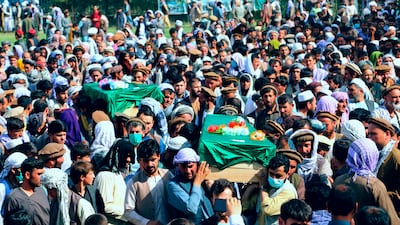The northern Afghan city of Faizabad, in the mountainous province of Badakhshan, is remote, even by the standards of Afghanistan’s poorly connected urban centres. Until the early hours of Wednesday, it was one of the few Afghan provincial capitals that had never been subjected to Taliban rule. Even at the height of the terrorist group’s power in the late 1990s, when it controlled 90 per cent of the country’s territory, Faizabad was a staging ground from which resistance groups controlling the other 10 per cent fought back. Now, it is the ninth provincial capital (out of a total of 34) to have fallen to the Taliban in just the past week.
Although the Taliban has advanced in Afghanistan at breakneck speed this summer, Faizabad’s capture was anything but sudden. The militants have been hammering the city and working their way through Badakhshan’s other districts for more than a year. Last month, as the tides began to shift decisively in the Taliban’s favour, several local government officials fled. Later, the Taliban flag was raised on the bridge linking the Badakhshan town of Ishkashim with its sister town (also called Ishkashim) in neighbouring Tajikistan.
Both towns are home to Ismaili Shiites, a religious group the Taliban has long oppressed, and inhabitants of Afghan Ishkashim are already being instructed to stay home if they are women and to cease shaving their beards if they are men. Some residents on the Tajik side have reported being unable to contact their Afghan neighbours, friends and relatives.
The fall of the other eight provincial capitals, which form an arc of population centres along Afghanistan’s western and northern borders, in quick succession was similarly foreseeable. Combined with its strongholds in the south and east, the Taliban is now believed to hold at least two thirds of Afghan territory. Meanwhile, the Afghan government has sought to project an image of strength, even as it becomes clear that the capital, Kabul, is being encircled.
While this week’s events were foreseeable, they were not inevitable. They mark a new low in Afghanistan’s security situation, which has deteriorated considerably since US President Joe Biden announced his plan to withdraw nearly all American troops from the country by September. The US continues to support Afghan forces with airstrikes, intelligence support and salaries for soldiers, but none of it has compensated for the demoralising effect the withdrawal is having on them.
The Afghan government’s European allies, too, have begun their own, speedy withdrawals. Even as their diplomats and soldiers evacuate Afghanistan, European nations continue to deport Afghan asylum seekers back home. Last week, in a letter to the European Commission, six European governments urged the Commission to “intensify talks with the Afghan government on how returns to Afghanistan can and will continue in the coming months”.
Afghanistan’s western allies must not capitulate entirely to the Taliban. They should consider how the unfolding humanitarian crisis is resulting in the displacement of thousands of families daily, compounding the suffering. They should also consider the situation that precipitated their intervention in the country in the first place, two decades ago, when Afghanistan was an impoverished, oppressive and poorly governed state that became a magnet for terrorist groups.
Should the US and European countries fail to balance their desire to leave with measures to prevent a total return to this state of affairs, it will be difficult to see what the sacrifices of the past two decades really achieved. Dramatically increasing financial and intelligence support to Afghan security forces, and upholding the rights of asylum seekers under international law, would be a good start.
The picture for Afghanistan is the grimmest it has been in two decades. By now, the Taliban’s charge to power may be too difficult to overcome. Should it eventually reach the capital, Afghans will be wondering whether the terrorist group really took the country, or whether it was given to them by Afghanistan’s friends.


